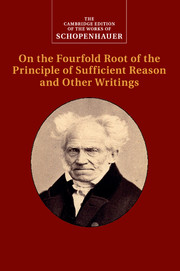Book contents
- Frontmatter
- Contents
- General Editor’s Preface
- Editorial Notes and References
- Introduction
- Notes on Text and Translation
- Chronology
- Bibliography
- Collation of the Two Editions of On the Fourfold Root
- 1 On the Fourfold Root of the Principle of Sufficient Reason
- 2 On Vision and Colours
- 3 On Will in Nature
- Glossary of Names
- Index
Sixth Chapter - On the Third Class of Objects for the Subject and the Form of the Principle of Sufficient Reason Governing in It
Published online by Cambridge University Press: 30 June 2022
- Frontmatter
- Contents
- General Editor’s Preface
- Editorial Notes and References
- Introduction
- Notes on Text and Translation
- Chronology
- Bibliography
- Collation of the Two Editions of On the Fourfold Root
- 1 On the Fourfold Root of the Principle of Sufficient Reason
- 2 On Vision and Colours
- 3 On Will in Nature
- Glossary of Names
- Index
Summary
EXPLANATION OF THIS CLASS OF OBJECTS
The third class of objects for the faculty of representation constitutes the formal part of complete representations, namely, the intuitions, given a priori, of the forms of the outer and inner senses, space and time.
As pure intuitions, they are objects of the faculty of representation by themselves and separate from complete representations and from the determinations of being full or empty which first arise through complete representations. For even pure points and lines absolutely cannot be presented, but can only be intuited a priori, just as the infinite extension and infinite divisibility of space and time are objects only of pure intuition and are foreign to empirical intuition.What distinguishes this class of representations, in which space and time are pure intuitions, from the first class, in which space and time are perceived (indeed, conjointly perceived) is matter; therefore, on the one hand I have explained matter as the perceptibility of space and time, and on the other hand as causality that has become objective.
In contrast, the form of understanding of causality is not by itself and separately an object of the faculty of representation, but first comes to consciousness with and in the material part of cognition.
PRINCIPLE OF THE REASON OF BEING
Space and time are so constitutedb that all of their parts stand in a relation to one another, so each of them determines and is conditioned by another.
In space, this relation is called position; in time, succession. These relations are unique, completely different from all other possible relations of our representations, and therefore, neither the understanding nor reason is capable of grasping them by means of mere concepts; rather, they are intelligible to us simply and solely by means of pure, a priori intuition since it cannot be made clear through mere concepts what is above and below, right and left, back and front, what is before and after. Kant quite correctly confirms this by explaining that the distinction between the right and left glove absolutely cannot be made intelligible any other way than by means of intuition.I call the law according to which the parts of space and time determine one another with regard to these relations the principle of sufficient reason of being, principium rationis sufficientis essendi.
- Type
- Chapter
- Information
- Schopenhauer: On the Fourfold Root of the Principle of Sufficient Reason and Other Writings , pp. 123 - 132Publisher: Cambridge University PressPrint publication year: 2012

